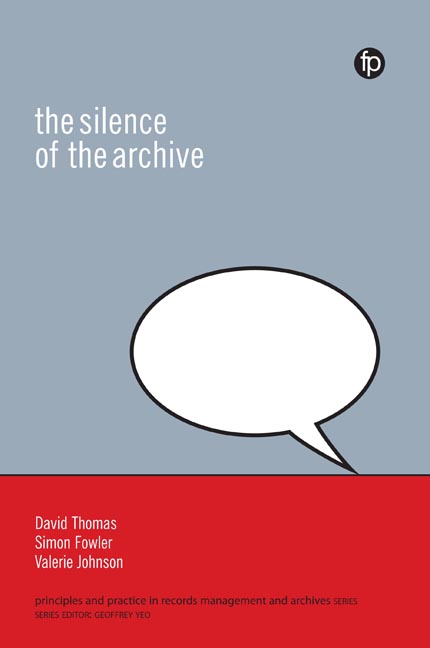Book contents
2 - Inappropriate expectations
Published online by Cambridge University Press: 08 June 2018
Summary
Introduction
This chapter focuses on the user experience of archives and what this can tell us about the Silence of the Archive.
Users work with an incomplete archive, whether material has been deliberately or accidentally destroyed, information still closed, or data just not recorded in the first place. Jessica Myerson says that: ‘Archives contain slivers of the historical events or processes that can be reconstructed and configured to give users of the archives … a window through which they can view the past’ (Myerson, Galloway and Bias, 2012, 1).
To the historian what survives and what has been destroyed can sometimes seem to be frustratingly random. But can a pattern be discerned? In this chapter, we will be looking at the user's experience of the Silence of the Archive: what has survived and why, as well as exploring what has been lost. We will also consider what the records cannot tell us and see whether any clues can be found in differing Western record-creating traditions. Perhaps the cataloguing process or the descriptions themselves hinder finding the records. The chapter concentrates on traditional paper records, which are those still handled by the vast majority of people who visit archival institutions.
Louise Craven (2008, 11) raised the question of the role of archives in facilitating identity construction. For some people, they are clearly essential. During the months and years after the collapse of the German Democratic Republic, citizens demanded to see the files kept on them by the Stasi, the East German secret police. According to Eric Ketelaar:
For these people, the files … were their files, the means to prove the wrong they had suffered, changing them from victim into plaintiff…. By destroying the file – or when access to the file is denied – one loses the means to prove the wrong, staying a victim for ever.
(Ketelaar, 2008, 13–14)Indeed, many users struggle to come to terms with the fact that records relating to their families either no longer exist or were never created. They may fall into the trap of believing that things only happened, or only exist, if they are documented.
- Type
- Chapter
- Information
- The Silence of the Archive , pp. 41 - 64Publisher: FacetPrint publication year: 2017



